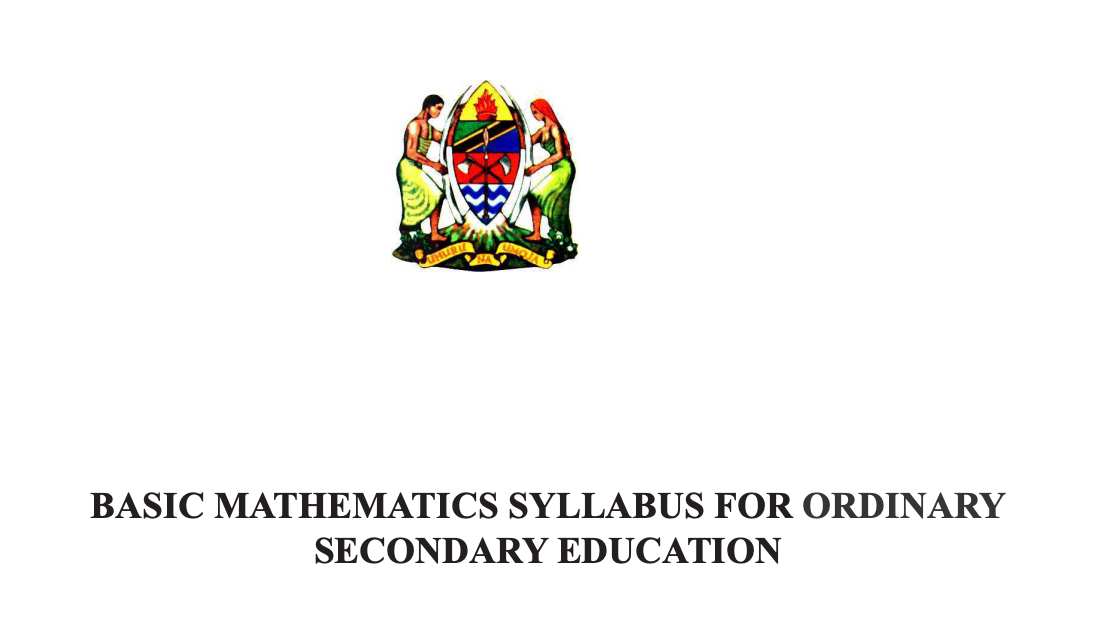BASIC MATHEMATICS SYLLABUS FOR ORDINARY SECONDARY EDUCATION (2024), mathematics syllabus for secondary school in Tanzania pdf, mathematics syllabus o level pdf, tie mathematics form one pdf free download, This Basic Mathematics syllabus is a revised version which has been prepared to replace that of 1996 which has phased out. The revision process focused on change in paradigm from that of content based to competence based curriculum. Moreover, the revision was inevitable due to the fact that the 1996 syllabus did not sufficiently consider the current social, cultural, global, technological, subject biases and cross cutting issues taking place worldwide but particularly in Tanzanian Society. In addition, the revision has also taken into consideration on the requirements for the Secondary Education Development Plan (SEDP). This syllabus has been introduced for implementation from January 2005.
Aims and Objectives of Education in Tanzania
The general aims and objectives of education in Tanzania are to:
- a) Guide and promote the development and improvement of the personalities of the citizens of Tanzania, their human resources and effective utilization of those resources in bringing about individual and national development.
- (b) Promote the acquisition and appreciation of the culture, customs and traditions of the people of Tanzania.
- (c) Promote the acquisition and appropriate use of literacy, social, scientific, vocational, technological, professional and other forms of knowledge, skills and attitudes for the development and improvement of the condition of man and society.
- (d) Develop and promote self-confidence and an inquiring mind, and understanding and respect for human dignity and human rights and readiness to work hard for self advancement and national development.
- (e) Enable and expand the scope of acquisition, improvement and upgrading of mental, practical, productive and other skills needed to meet the changing needs of industry and the economy.
- (f) Enable every citizen to understand the fundamentals of the National Constitution as well as the enshrined human and civic rights, obligations and responsibilities,
- (g) Promote the love and respect for work, self and wage employment and improved performance in the production and service sectors.
- (h) Inculcate principles of the national ethic and integrity, national and international cooperation, peace and justice through the study, understanding and adherence to the provisions of the national constitution and other international basic charter.
- (i) Enable a rational use, management and conservation of the environment.
Aims and Objectives of Secondary Education in Tanzania
In Tanzania, secondary education refers to post primary formal education offered to the learners who successfully completed seven years of primary education and have met the requisite entry qualifications.
The aims and objectives of secondary education are to:
- (a) Consolidate and broaden the scope of baseline ideas, knowledge, skills and attitudes acquired and developed at the primary educational level.
- (b) Enhance the development and appreciation of national unity, identity and ethic, personal integrity, respect for human rights, cultural and moral values, customs, traditions and civic responsibilities and obligations.
- (c) Promote the development of competency in linguistic ability and effective use of communication skills in Kiswahili and in at least one foreign language.
- (d) Provide opportunities for the acquisition of knowledge, skills, attitudes and understanding in prescribed or selected fields of study.
- (e) Prepare students for tertiary and higher education, vocational, technical and professional training.
- (f) Inculcate a sense and ability for self-study, self-confidence and self-advancement in new frontiers of science and technology, academic and occupational knowledge and skills.
- (g) Prepare the student to join the world of work.
General Competences
By the end of the four years course, the student should have the ability to:
- (a) Think critically and logically in interpreting and solving problems.
- (b) Use mathematical languages in explaining and clarifying mathematical ideas.
- (c) Apply mathematical knowledge and techniques in other fields.
General Objectives
By the end of the four years course, the student should be able to:
- (a) Promote the development and application of mathematical skills in solving practical problems in daily life.
- (b) Apply mathematical concepts in interpreting situations at local and global levels.
- (c) Develop a foundation of mathematical knowledge, techniques and life skills for studying mathematics and related subjects


